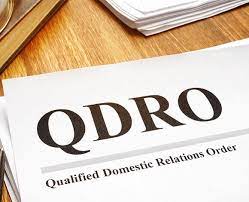Can QDROs lead to litigation?
 We are often approached by a recently divorced person who asks whether her QDRO can lead to further litigation. After a lengthy divorce, one assumes that there won’t be more litigation. However, litigation specifically involving QDROs is possible.
We are often approached by a recently divorced person who asks whether her QDRO can lead to further litigation. After a lengthy divorce, one assumes that there won’t be more litigation. However, litigation specifically involving QDROs is possible.
A recent unreported case is an excellent example. Jean-Baptiste v. Jean-Baptiste, No. 1641-2023 (Md. Ct. Spec. App. Sep. 25, 2024).
In Jean-Baptiste, the parties divorced in 2021, after entering into a Marital Settlement Agreement. Therein, Husband agreed that Wife would receive a share of his retirement benefits, namely his FERS and TSP (two of the most common plans in the greater Washington DC area). Also, the Court ordered that a specific attorney draft the QDROs (Weinberg & Schwartz is often named in Marital Settlement Agreements as the drafter of QDROs. This saves time because it’s one less things to argue over.) Finally, the Marital Settlement Agreement contained language that required that any change to the agreement had to be done in writing and that the terms of the Marital Settlement Agreement could not be modified by the court.
Upon this background, the parties first returned to court in 2023, when Wife sought to enter two QDROS which Husband had failed to sign. By that time, in consultation with drafter, the parties had made a few minor changes to the draft QDROs. Husband, nevertheless, remained reluctant to sign the QDROs because he disputed the validity of the original Marital Settlement Agreement. Despite this, when the Court inquired whether he was consenting to the entry of the QDROs, Husband responded “Yes.”
A few weeks later, Husband filed several motions dispute the QDROs. Within them, Hus-band made three arguments. First, he argued that the QDROs were a modification of the Marital Set-tlement Agreement, which was prohibited by the MSA. Second, he argued that the QDROs were not drafted by the drafted named in the Marital Settlement Agreement. And, third, he argued that the QDROs were a modification of the Marital Settlement Agreement ordered by the Court, which was also prohibited by Marital Settlement Agreement.
The Court disagreed and entered the QDROs. Husband appealed to the Appellate Court of Maryland, emphasizing the same three arguments.
The Appellate Court was not persuaded by Husband’s arguments. Overall, the Appellate Court first observed that Husband had agreed to the entry of the QDROs in Court (consenting by say-ing “yes”), that he was bound by his agreement, and could rescind or modify his agreement after the fact. Next, the Appellate Court turned to Husband’s three arguments. First, the Appellate Court held that although the parties had agreed that any modification of the Marital Settlement Agreement would be in writing, Husband waived that requirement when he consented to the entry of the QDROs in Court. Second, the Appellate Court held that although the parties had been ordered to use a specific drafter and then making minor changes themselves, Husband had waived this objection when he consented to the entry of the QDROs in Court. And, third, the Appellate Court held that alt-hough the parties had agreed that the court could not modify the Agreement, Husband had also waived that requirement when he consented to the entry of the QDROs in Court.
The Appellate Court affirmed the lower court and the QDROs were not set aside.
This case serves as a great example of how the entry of a QDRO can lead to litigation. It took more than two years after the divorce for the QDRO litigation to be resolved.
If you are facing the possibility of QDRO litigation, please call Weinberg & Schwartz.










